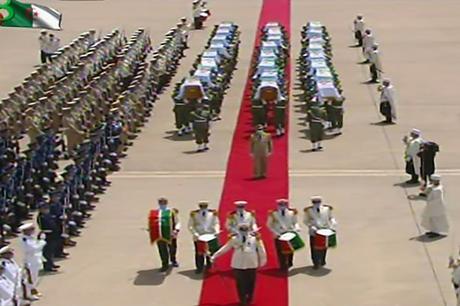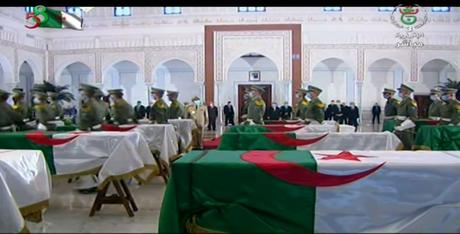
(Algiers) Red carpet, hedge of honor, drum and cannon sound. Algeria recovered the remains of on Friday during a military ceremony of its combatants killed at the start of French colonization in 19 e century, after their return by France, a gesture of appeasement in volatile bilateral relations.
Posted on July 3 2020 at 9 a.m. 57
Abdellah CHEBALLAH, with Philippe AGRET in Tunis
France Media Agency
A Hercules C – 130, carrying the remains mortuary – skulls – landed at Houari Boumedienne Airport in Algiers in the early afternoon, accompanied by Sukhoï Su hunters – 30 of the Algerian army.
The coffins, kept since 19 e century in the collections of the National Museum of Natural History of Paris, were solemnly welcomed by the Algerian president Abdelmadjid Tebboune and the new head of state- major Saïd Chengriha.
Covered with the national flag, the coffins of the 24 “chouhada” (martyrs) were slowly worn by soldiers wearing sanitary masks, to the sound of 21 cannon shots.
“The sirens of the boats roar in the port of Algiers, a true moment of emotion in an incredibly silent city,” tweeted at the same time a user.
Accompanied by a motorcade of bikers, the coffins were then transported to the Palace of Culture, where they will remain on display throughout the day on Saturday.

IMAGE FROM ALGERIAN TELEVISION VIA AFP
The Ministry of Moujahidine (Veterans Affairs) called on the population to come and meditate in front of the remains – while respecting physical distancing, a pandemic requires.
“The heroes of the Popular Revolt return to the lands for which they sacrificed their lives”, welcomed the army chief, Saïd Chengriha, blasting “the hideous face of colonialism”.
The skulls will be buried Sunday, Independence Day, in the “Martyrs Square” at the El Alia cemetery in Algiers, where the great figures of the Revolutionary War are buried.
Their return by France is a strong sign of a thaw in relations between Algeria and the former colonial power, marked since 1962 by recurring polemics and tensions.
“This gesture is part of a process of friendship and lucidity on all the wounds in our history,” commented the Élysée on Friday.
“Reconciliation of memories”
“This is the meaning of the work that the President of the Republic has undertaken with Algeria and which will be continued, with respect for all, for the reconciliation of the memories of the French and Algerian peoples”, added the French presidency.
Colonized for 132 years (1830 – 1962), Algeria had announced Friday by the voice of Mr. Tebboune the return “of the spoils of 24 leaders of the Popular Resistance “,” heroes who faced the brutal French occupation, between 1838 and 1865, and the savage enemy beheaded in retaliation before transferring their skulls overseas. ”
It was not until January 2018 that Algeria officially asked France for handing over of the skulls – several dozen – and of the colonial archives.
During a visit to Algiers in December 2017, French President Emmanuel Macron had committed to restoring the Algerian human remains stored at the Musée de l'Homme, one of the sites of the National Museum of Natural History.
The same year, but before his election, he called the colonization of Algeria in Algiers a “crime against humanity”.
“Dark Pages”
It is an Algerian historian, Ali-Farid Belkadi, who raised in 2011 the question of skulls after research at the museum. He then deplored that the skulls were “caulked in vulgar cardboard boxes, which evoke the packaging of shoe stores”. A criticism refuted by the museum management.
Several petitions signed in particular by historians had demanded the return of these remains in Algeria.
“Through this kind of gesture, France is rediscovering its History. This helps to get out of the dark pages of our history, “historian Benjamin Stora told AFP.
“There is a global movement to reclaim the history of peoples and France cannot miss this,” he said.
The memory question remains at the heart of the conflictual relations between France and Algeria, where the perception is that France is not doing enough to settle its colonial past.
Algerian deputies have just adopted a “historic” law establishing a Day of Memory, May 8, in memory of the massacres of 1865 committed by French forces in Sétif and in Constantinois (east).
Algiers also wants to put on the table the file of “disappeared” during the war of independence (1954-1962) – more than 2200 according to Algiers – and that of the French nuclear tests in the Algerian Sahara which “have made and continue to make victims”.
This gesture of appeasement – unprecedented – comes in the midst of a debate on the atrocities of the former colonial powers around the world after the death of George Floyd, a black forties, asphyxiated by a white police officer in the United States.

